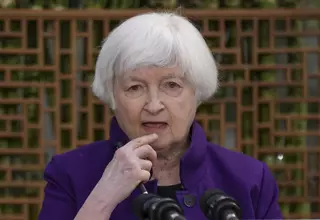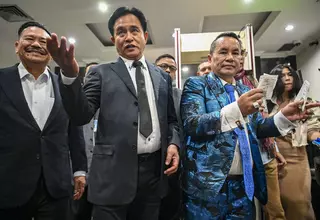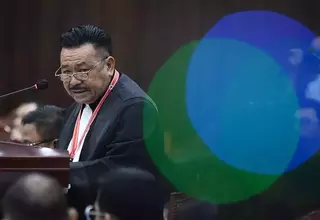BOJ Sticks to QE With Inflation Set to Stall
The Bank of Japan kept its record stimulus unchanged, even as it warned that cheaper energy prices will bring inflation to a halt in the world’s third-largest economy.
The BOJ maintained a pledge to expand the monetary base at an annual pace of 80 trillion yen ($660 billion), as forecast by all 34 economists in a Bloomberg News survey. While it said consumer price gains will slow to about zero percent “for the time being,” the central bank stuck to its view that the economy will continue a moderate recovery.
Governor Haruhiko Kuroda is counting on the benefits of lower oil prices to wash through the economy, spurring growth and inflation in the longer term.
The immediate focus is on the outcome of wages talks between companies and their unions that will indicate whether businesses are passing along more of their record cash holdings and profits to workers.
“The BOJ is admitting that consumer prices could fall, while indicating that it’s not planning steps to counter that,” said Koya Miyamae, an economist at SMBC Nikko Securities. “The shift cements a view that the BOJ won’t add stimulus for a while. They are likely to defend their position by pointing to encouraging signs in the wage talks and an expected fading impact of oil on consumer prices.”
The yen was little changed at 121.38 per dollar at 12:48 p.m. in Tokyo on Tuesday. It’s weakened about 22 percent since Kuroda began the record easing in April 2013.
The Topix index of shares climbed by 0.9 percent.
Nearly two years since the BOJ introduced unprecedented easing, the central bank’s main inflation gauge has slowed to just one-tenth its 2 percent target as tumbling oil prices ripple through the economy. Twenty-seven economists in the Bloomberg survey forecast consumer prices will decline around the middle of this year.
The BOJ’s estimate of CPI dropping to about zero contrasts with its view last month that it was “likely to slow.”
Twenty-three of 34 economists in the Bloomberg survey expect the BOJ to expand stimulus by the end of October, down from 26 in a survey last month.
Eleven predict no further easing, up from eight in the previous survey.
Companies including Japan’s biggest automakers are expected to announce counterproposals to union demands in talks that Kuroda said he’ll watch with “strong interest.”
The BOJ will be watching to see the extent of any damage to expectations for price gains that could threaten the outlook for reaching the 2 percent goal, Deputy Governor Hiroshi Nakaso said in a speech on March 9. Wage negotiations, along with firm’s price setting and household spending, are reflected in inflation expectations, he said.
Wage talks
The talks, in which companies and union leaders work out wage plans for the fiscal year starting in April, follow a campaign by Prime Minister Shinzo Abe to persuade corporate Japan to give bigger raises.
There are signs that some companies will increase outlays. Toyota Motor Corp. offered to boost its monthly base wage by 4,000 yen, one-third less than what its labor union requested, but still a 1.1 percent raise, according to a spokesman for the Toyota Motor Workers’ union.
The company forecasts a record profit for the year ending this month.
The challenge for Abe is to secure pay gains for households that outpace the rising cost of living.
Last year’s sales-tax increase and higher costs of imported products brought by the yen’s declines pushed down real incomes, crimping spending in the world’s third-largest economy.
Base wages
BOJ officials assess that average base wage increases of 1 percent are needed in the coming fiscal year to sustain Japan’s emergence from two decades of stagnation, people familiar with central bank’s discussions said in January.
It was the last scheduled meeting for Ryuzo Miyao, whose five-year term on the board ends on March 25.
Miyao supported every policy decision by Kuroda, including October’s 5-4 vote to increase stimulus.
Taking Miyao’s seat is economics professor Yutaka Harada, who is likely to vote in line with Kuroda, according to 30 economists in the Bloomberg survey.
Bloomberg
Tags: Keywords:POPULAR READS
Yellen Says Iran's Actions Could Cause Global 'Economic Spillovers'
Iran's missile attack on Israel early Sunday came in response to what it says was an Israeli strike on Iran's consulate in Syria.Takeaways from Prabowo's Responses to Legal Motion Contesting His Election Win
Part of the argument addresses the claim that the candidacy of Gibran Rakabuming Raka, Prabowo’s running mate, is unlawful.Prabowo Camp Cites ‘Procedural Error’ in Legal Challenge by Rival Candidates
The Constitutional Court's main task is to address alleged discrepancies in vote tallies, which neither of the plaintiffs challenged.Apple Wants to Increase Investments in Vietnam
Vietnam has become more important to Apple as the company seeks to diversify its supply chains away from China.China’s Top Diplomat Wang Yi to Visit Indonesia for Cooperation Talks
Chinese top diplomat Wang Yi will chair a policy coordination meeting aimed at strengthening Indonesia-China cooperation.Popular Tag
Most Popular























